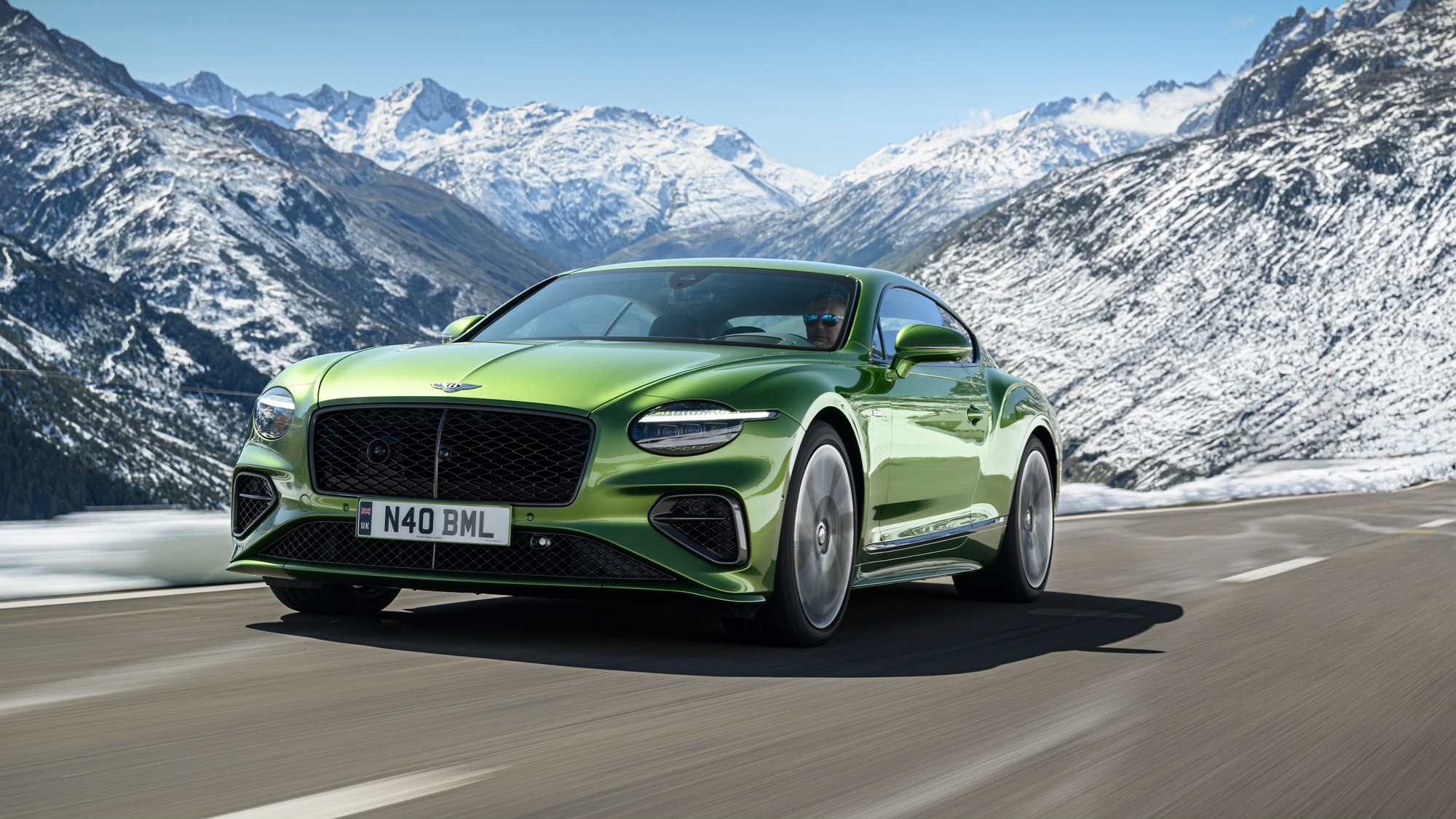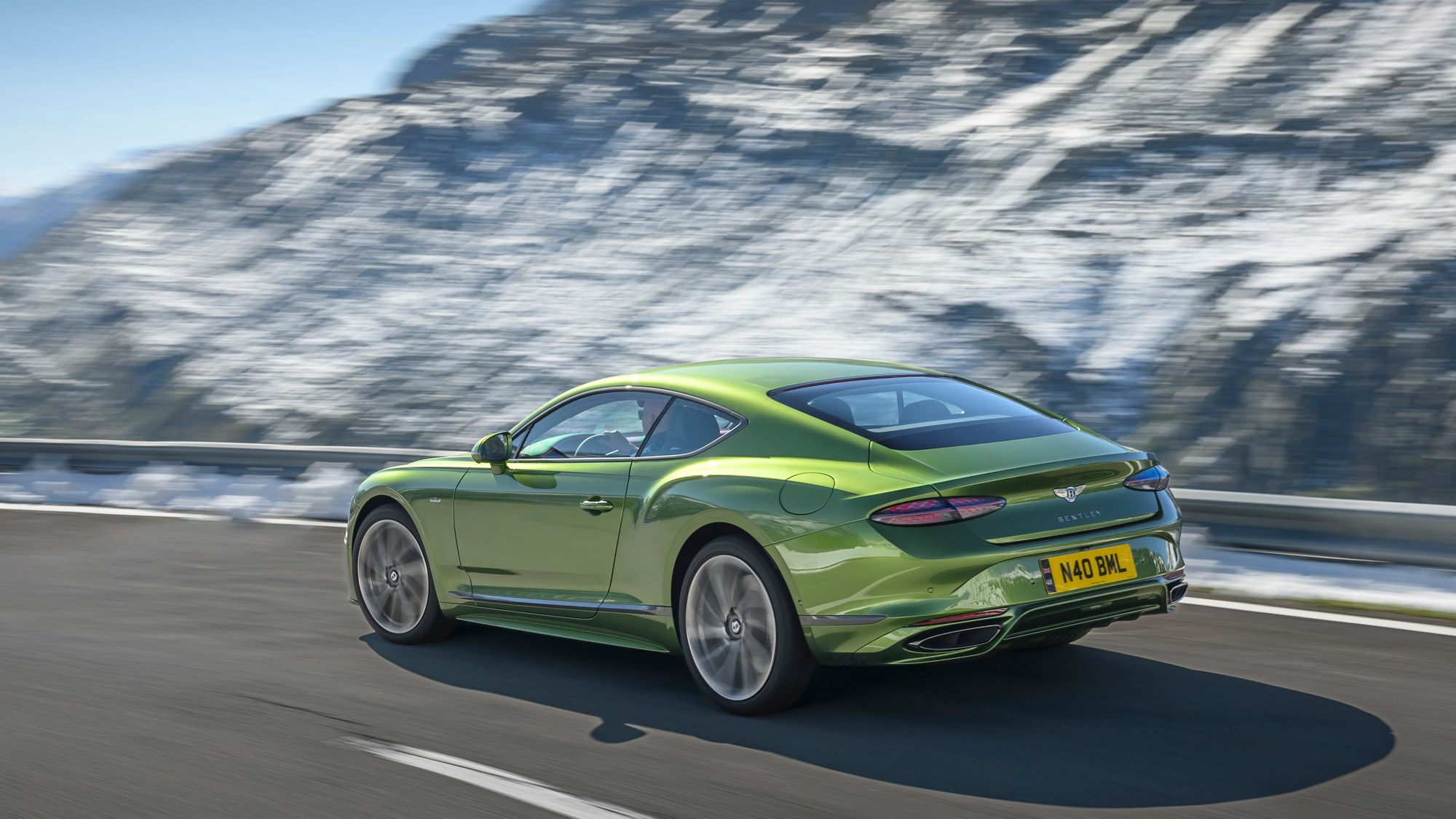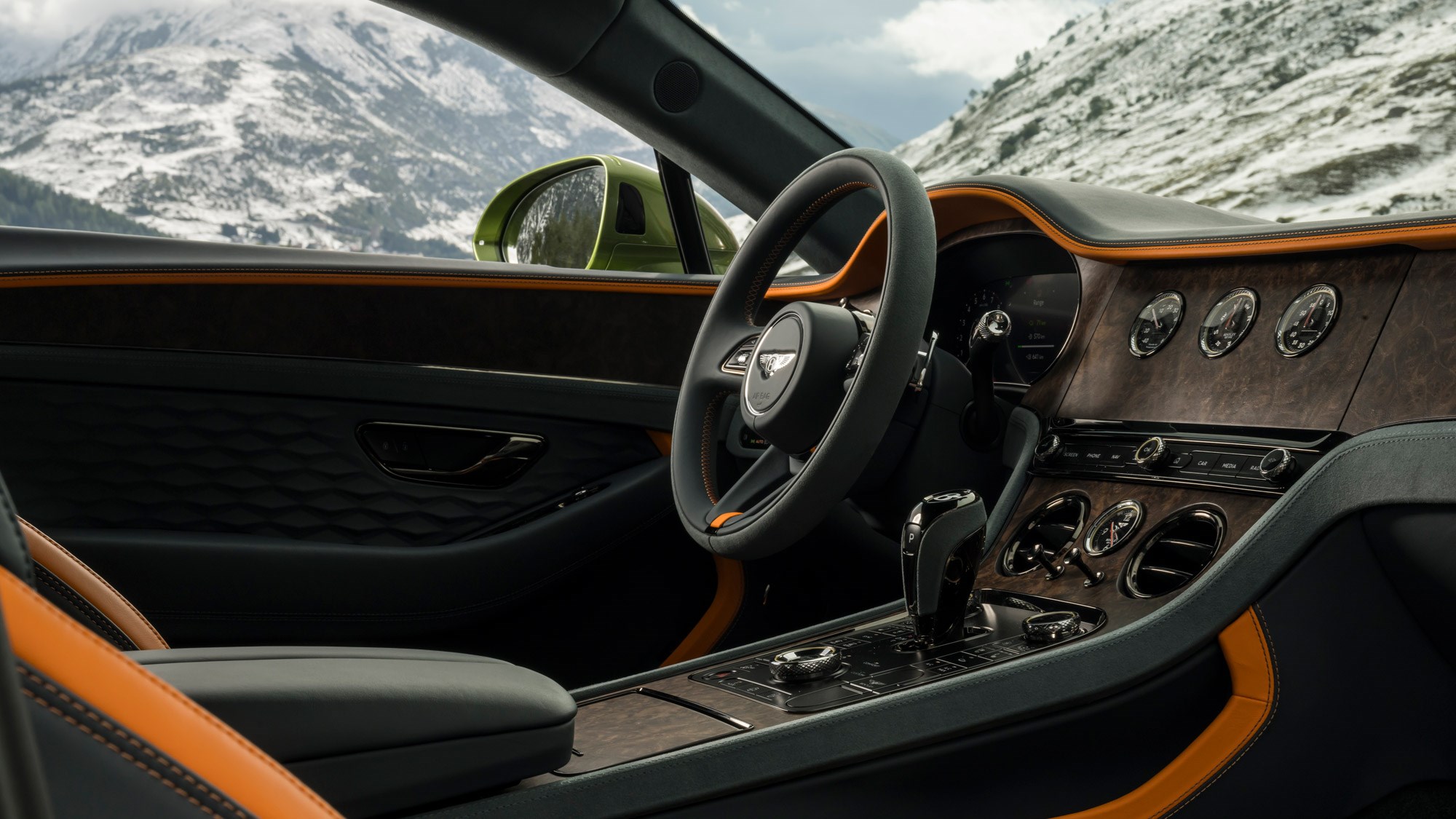► Bentley’s plug-in hybrid roll-out reaches the Continental GT
► Flagship Speed delivers 771bhp, 738lb ft, 0-62mph in 3.2sec and 208mph
► 50 miles of e-only range, improved fuel efficiency
When you absolutely, positively had to have the fastest version of Continental GT, Bentley would place a hand in the small of your back and guide you in the direction of the W12 Speed. Powered by the spunkiest version of Crewe’s W12 engine and made more playful than lesser GTs by the addition of rear-wheel steering and an electronic limited-slip diff, it offered a compelling mix of luxury, outrageous performance and playfulness.
But now the W12 is dead, forcing this new, fourth-generation Conti GT to lean on a V8 plug-in hybrid.
You have to feel for the plug-in hybrid as a concept. If it’s regularly on the therapist’s couch, trying to understand its place in the world, you can see why. Cruelly labelled ‘a transitional technology’, it was only meant to work like Saturn’s booster rockets, firing us clear of the combustion engine’s cloying orbit before falling away as we sailed into the starlit wonder of fully electric.
But as EV supply continues to be met with lukewarm demand, the PHEV is coming of age as a solution in its own right. So, how does hybridisation fit with Bentley’s sporting 2+2?
At a glance
Pros: towering performance, generous and impressive electric-only capability
Cons: it’s heavy, tiny boot is now smaller still
What’s new?
Bentley hybridised the Bentayga SUV a few years back, but this new powertrain – available now in the new, fourth-generation Continental GT and soon in the Flying Spur – is a bit special. It brings together a heavily revised twin-turbo V8 engine, a 25.9kWh battery and an electric motor.

The motor lives in the transmission while the battery is under the boot, where it steals some 100 litres of capacity (a loss the convertible in particular can ill afford), delivers seamless shifts by boosting mid-gearchange and helps even-up the GT’s traditionally nose-heavy weight distribution, although the powertrain helps swell the kerb weight from 2273kg to 2459kg (and this despite the swap from a W12 to a V8 in the Speed).
The engine, freed of the need for impeccable manners by the e-motor, runs more efficient single-scroll turbos and does away with cylinder deactivation.
What are the specs?
The battery and 188bhp, 332lb ft motor have the power to cover some 50 miles, cater for all your throttle demands up to 75 per cent and hit 87mph before waking the V8. Impressive given the Speed’s now a 2.5-tonne car. Lob the V8 into the mix as well and the numbers get pretty crazy, pretty quickly: 771bhp, 738lb ft, 0-62mph in 3.2sec and a top speed of 208mph.
What’s it like to drive?
‘I don’t know if I’ll be able to get excited about developing a car without an electric motor again,’ says Bentley’s product line director, Chris Cole. And to drive the new plug-in hybrid Continental GT Speed, is to demonstrate why.

Around town, in Comfort mode, the Speed defaults to electric power and it’s a beautiful fit with both the brand and the car; hushed, strong and smooth like greased caramel. And when you get out of town the powertrain’s combined fireworks are very impressive. The e-assisted, any-rev drive the plug-in hybrid Speed is able to summon is gobsmacking, with so much grunt that gear selection is almost irrelevant.
Because of the car’s weight, the recently retired V8 GT wasn’t always able to deliver the imperious acceleration the asking price promised. Even the W12 Speed – the now defunct flagship – needed to be worked hard to really fly. The new union of 591bhp V8 and 187bhp electric motor sketches some magnificent power and torque curves (peaking at 771bhp and 738lb ft respectively) and eclipses the ‘old’ W12 Speed everywhere; down low, up high, on a PowerPoint and high on a mountain pass. And whether you’re flat-out or footling, the two power sources are artfully integrated, free of stutter or indecision.
Get your foot down, even on a wet mountain pass, and the rear-biased four-wheel drive pulls off minor miracles, laying more torque to damp, cool tarmac than should be in any way feasible. Speed is gained at a quite despicable rate while the fruity tuning of the exhaust – its boisterous racket is all sound waves, no synthesiser – sounding for all the world like a herd of escaped NASCAR. I’m no expert but I’m sure the gravity should be holding us back in some way, particularly given the Speed’s now a 2.5-tonne car. But 738lb ft of torque appears to have met with it in a gloomy bar and paid it off.

The uprated chassis happily copes, too. The steering is largely unchanged but feels sharper thanks to the stronger rear bias to the all-wheel-drive system (more weight over the rear axle gave Bentley’s engineers the confidence to put more power rearwards), pivoting the car effortlessly into corners (more accurately, the Speed steers from both ends of course; rear-wheel steering is standard)
Lateral grip and body control are both heavyweight, and where rippled tarmac could set the previous car’s suspension pattering, particularly in Sport, the new Speed, with its dual-valve dampers, rides with authority. The previous, single-valve dampers had to compromise their rebound control to optimise performance in compression; these don’t.
What’s it like inside?
That great swathes of the Continental GT’s sheet metal go unchanged might suggest gentle evolution beneath the skin. But this is a comprehensive technical update, not least because the move to hybrid power necessitated a migration to a new electrical architecture similar to the Bentayga’s.

The visible elements of this include updated digital displays and some nice new functionality, including remote parking for those tighter Waitrose bays and the ability to install apps directly into the car. The upsides include a more convenient user experience and fewer issues with global compatibility.
Some smart new graphics are the only obvious physical change inside (to help you track the hybrid system’s machinations), though the Conti GT’s interior was always one of its strongest assets. There’s also a whole heap of options within the configurator, so if trad wood ’n’ leather isn’t your vibe, something in there will be.
Verdict
At once both the most capable and dynamically rewarding Conti GT yet, the Speed is one of few cars for which part-electrification feels a perfect fit. Decadently fast, more comfortable than ever and now with that slinky EV drive capability that feels so right in day-to-day use, the Speed – for now the only Conti GT – is a compelling flagship.